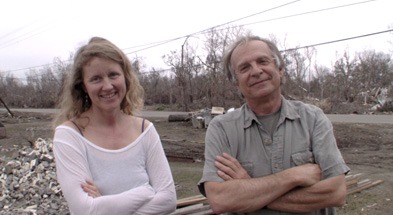
Company/Organization Profiles | Film Funding | Rhode Island | Vermont
Documenting Change: The LEF Foundation’s New Goals and Grant Guidelines
Written by Jared M. Gordon | Posted by: erin
While creative professionals continue to adapt in the face of economic hurdles, the LEF Foundation, founded in 1985 to support contemporary art, has made changes of its own with ramifications that impact both narrative and documentary filmmakers seeking financial assistance.
The LEF Foundation has offices in Cambridge and San Rafael, CA, although its East Coast branch is primarily concerned with supporting the efforts of independent filmmakers in New England. According to LEF New England program officer Kathryn Ostermier, ‘Our goal is to supplement contemporary arts and to further the insertion of thought provoking art in the public sphere.” They’ve worked with 193 projects since 2002.
Through its Moving Image Fund, LEF has supported cross-genre, documentary, narrative, and animated pieces, and has worked with New England filmmakers such as James Rutenbeck (Raise the Dead, Scenes from a Parish), Lucia Small (My Father the Genius, The Axe in the Attic), and Robb Moss (Riverdogs, Secrecy).
However, in the past year, LEF has recently sharpened the Moving Image Fund’s focus and revised its guidelines to concentrate solely on funding independent documentary work. According to Ostermier, ‘This strategic decision will enable us to invest on a deeper lever with fewer larger grants and more consistent support of these projects.’
Ostermier called the 2009 cycle a “transition year.” In reference to how the overall amount funded compares to years past, she said: “Normally we had given out just slightly more than $200,000 total and this year it will be no more than $200,000.”
In 2009, the Moving Image Fund will make no more than 10 grants of up to $5,000 for pre-production; no more than five grants of up to $15,000 for production; and no more than three grants of up to $25,000 for post-production.
Proposals must be received by the LEF on or before January 30, 2009.
For the next three to five funding cycles, which typically happen once per year, the focus remains on documentaries. But those who favor non-documentary styles can keep the future in mind, according to Ostermier. ‘By focusing on one genre and learning how best to support it, we can take what we learn and apply it to other genres in film.’
What is it about documentary filmmaking that is so attractive to LEF? Ostermier continued, ‘In looking at the landscape of the region, there’s a strong documentary tradition in Boston and New England, with special emphasis on personal documentaries. We wanted to draw upon and give attention to that innovation.’
Filmmaker Lucia Small has had a good relationship with LEF for over 15 years. ‘There are very few funders out there, and I don’t know of another one that takes on the risks that they take on with the new artists they support. Their new grant guidelines have refined and better defined their goals, and it’s an evolution that makes sense to me.’
Small went on to describe the sorts of films that would be attractive to LEF, “The LEF group values the stronger ideas of art and innovation rather than commercial viability. They want the work that they fund to do well, but they’re really concentrating on their mission to support more innovative work.”
Documentarian James Rutenbeck said, ‘Their support was vital to my projects, but they’re also very careful about choosing which projects to fund.’
While narrative filmmakers may need to seek other sources of support for the time being, applicants in need of documentary funding should keep the following in mind, according to Ostermier: ‘We’re looking for a strong story. Our favored applicants have a plan for a more personal, artistically explorative documentary rather than an instructive piece.’
LEF makes it a point to observe and act upon industry trends, according to Ostermier, ‘We’re nimble, and we always have an ear to the ground, watching shifts in the local landscape. Through our support of the Alliance for Independent Motion Media, we were instrumental in the development of the Lens on the Bay State research and policy piece, which in turn helped to pass the tax incentive legislation.’
Documentary filmmaker and Harvard professor Robb Moss put it bluntly, “The changes at the LEF have a very positive effect on myself and for other documentary filmmakers, old and young.”
‘Everything you need to know about applying to the LEF Moving Image Fund,’ will take place Wednesday, December 10th, 6:30-9 pm at 93 Border Street in West Newton. The workshop is free but RSVP is required.
Filmmakers interested in learning more about the LEF Foundation can visit www.lef-foundation.org.
'Everything you need to know about applying to the LEF Moving Image Fund,' will take place Wednesday, December 10th, 6:30-9 pm at 93 Border Street in West Newton. The workshop is free but RSVP is required. Filmmakers interested in learning more about the LEF Foundation can visit www.lef-foundation.org.











